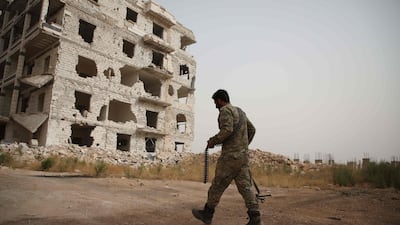The Syrian government on Saturday attacked a demilitarized zone in the country’s last rebel-held province, undermining an agreement reached in September between regime ally Russia and rebel backer Turkey in an attempt to spare the populous region a full-out military assault.
Syria’s northern Idlib province, home to around 3.5 million people, including more than one million internally displaced persons, has been under the threat of a full-scale military assault by pro-government forces since at least September, after sweeping government victories saw loyalists of President Bashar Assad retaking a string of territories formerly held by either militants or opposition forces.
The Syrian government is estimated to be in control of sixty per cent of Syria. The rest of the country is held by US-backed Kurdish forces, with the exception of Syria’s north, which is the main bastion of rival opposition forces, including Al Qaeda-linked groups and Ankara-backed rebels, who command a buffer-zone along Turkey’s border.
The Syrian army on Saturday shelled parts of southern and eastern Idlib, according to the Edlib Media Center (EMC), an activist-run war monitor.
The UK-based Syrian Observatory for Human Rights (SOHR) says that government attacks also targeted adjacent territory in northern Hama province.
At least one woman and one child were killed and at least two children were wounded in Saturday’s shelling on Idlib and Hama, the SOHR said. Saturday’s casualties bring the total number of people killed by government shelling on the demilitarized zone to 102 since October, the monitoring group says.
Omar Khattab, a military spokesman for the Ahrar Al Sham rebel group says that regions adjacent to government-held territory in Hama have seen the most shelling.
______________
Read more:
Syrian rebels accuse Russia of hand in Idlib attack
Amid the tensions in Syria, there is hope for US-Russian cooperation
______________
EMC head, Obeida Fadel, told The National that government violations have mainly targeted Idlib’s southeast. He described violations as “sporadic” and added that shelling was accompanied by small infiltration attempts by government forces in areas adjacent to southern Idlib. The government, however, has not resumed airstrikes.
Mr Fadel says that attacks intend to undermine the Russian-Turkish agreement, which the Syrian government has criticised repeatedly in recent weeks.
The Syrian government last month said Turkey was not meeting its obligations under the deal, brokered in the Russian resort city of Sochi in September. Foreign Minister Walid Al Moualem said that the fact that militants continued to operate within the demilitarized zone, despite the expiry of a deadline for them to withdraw, is an indication that Turkey has failed to uphold its end of the agreement.
Hay’at Tahrir Al Sham, an alliance of radical militants, that includes Al Qaida’s former affiliate in Syria, is still believed to be operating in the area.
Meanwhile, Syria’s state-run SANA news agency says that Saturday’s shelling came in response to attempts by “terrorists” to attack military posts in Hama’s northwestern countryside.
Citing an unidentified military source, SANA said that a number of Syrian soldiers were killed and others were wounded in clashes with militants, who were trying to cross into government-controlled territory, on the edges of the demilitarised zone.

